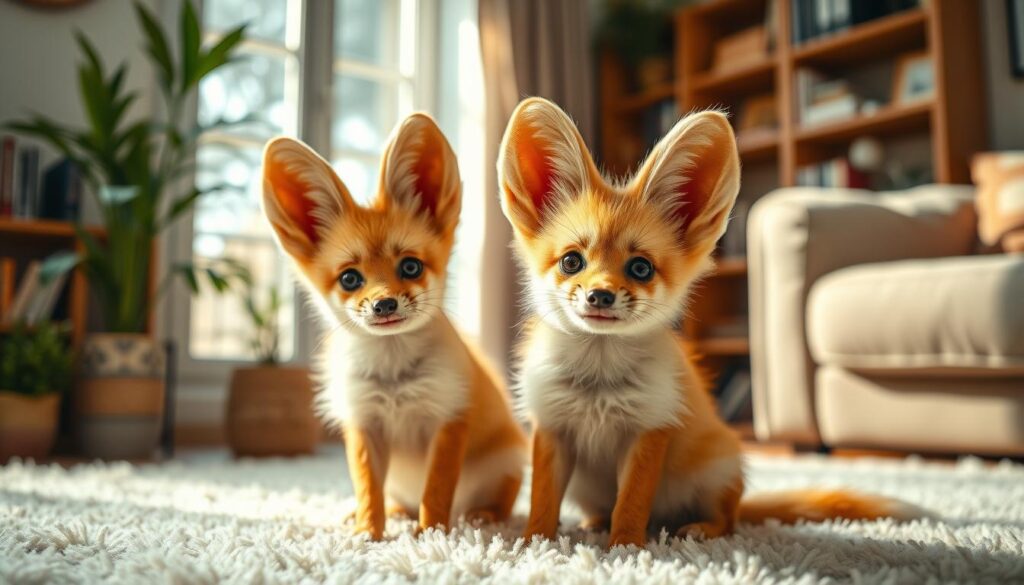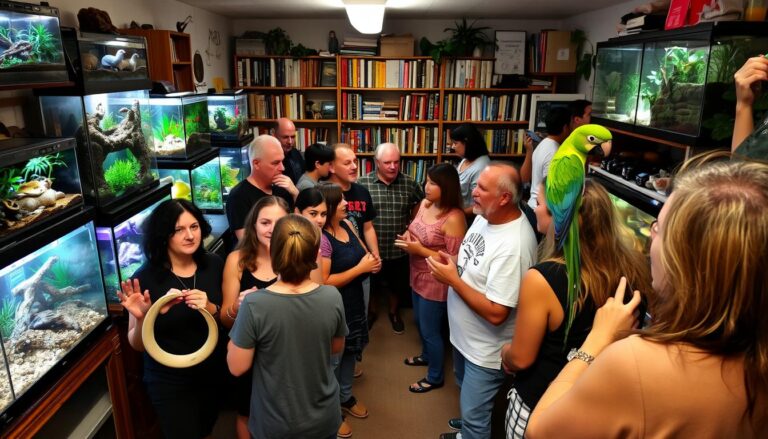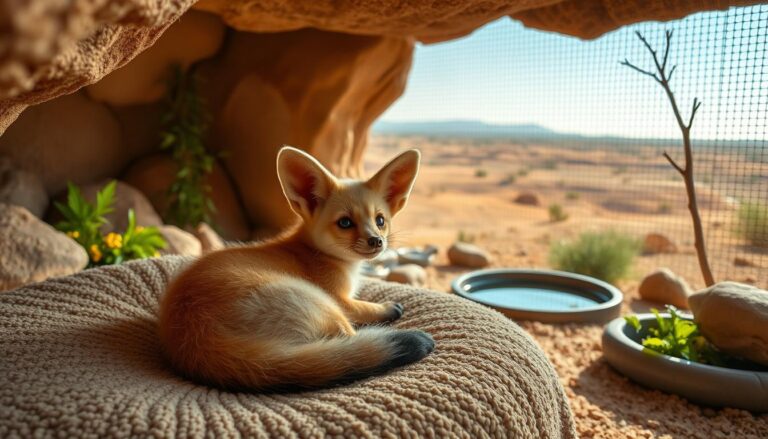The Truth About Keeping Fennec Foxes at Home
Learn the truth about keeping Fennec Foxes at home with our guide. Understand their requirements and the challenges you may face.
Are you considering bringing a fennec fox into your family? These unique animals have gained popularity as exotic pets due to their striking appearance and small size. Native to the sandy desert regions of northern Africa, fennec foxes are well adapted to harsh environments.
However, their wild instincts and specific survival adaptations make their care requirements significantly different from domestic pets. Before deciding to own a fox, it’s essential to understand the full picture of their needs and the legal considerations surrounding exotic pet ownership.
Key Takeaways
- Fennec foxes are wild animals with specific care requirements.
- Understanding their natural characteristics is crucial for potential owners.
- Legal considerations vary for exotic pet ownership.
- Specialized care is necessary for these desert-dwelling canids.
- Potential owners must assess their lifestyle and home situation.
What Are Fennec Foxes?
Understanding what fennec foxes are is crucial for anyone considering bringing one home as a pet. Fennec foxes are fascinating animals with unique characteristics that set them apart from other canid species.
Physical Characteristics
Fennec foxes are the world’s smallest canid species. They have a head and body length of 14 to 16 inches and weigh between 2 to 3.5 pounds. One of their most distinctive features is their large ears, which can be 4 to 6 inches long. These oversized ears help to dissipate excess body heat on hot days. Their cream-colored fur provides excellent camouflage in their desert habitat.

Natural Habitat and Behavior
Fennec foxes are adapted to life in arid desert environments. They are capable of inhabiting the remotest sand seas, with stable sand dunes being their ideal habitat. In the wild, they are highly social animals that live in family groups of up to 10 individuals, digging complex burrow systems to protect themselves from extreme temperatures. Their diet includes insects, small rodents, birds, eggs, and plant matter, allowing them to survive with minimal water intake.
- Fennec foxes are nocturnal hunters, obtaining most of their hydration from their food sources.
- Their thick fur on the feet protects them from hot sand and improves traction.
- These foxes are well adapted to their desert environment, with their fur and behavior helping them survive extreme conditions.
The Appeal of Fennec Foxes as Pets
The charm of fennec foxes as pets is rooted in their exotic appearance and active personalities. These unique animals captivate many with their oversized ears and playful nature.

Their Unique Appearance
Fennec foxes are instantly captivating due to their exotic and distinctive appearance, featuring miniature size, oversized ears, and fox-like features. This unique package makes them undeniably adorable to many.
Playful and Active Nature
Their high energy levels and playful demeanor can be entertaining, as they display bursts of activity with quick movements, jumping, and playful behaviors. Some owners compare this to a perpetual puppy stage, making them a delightful companion for the right owner.
Legal Considerations Before Getting a Fennec Fox
Prospective fennec fox owners must first familiarize themselves with the legal requirements that govern exotic pet ownership in their area. The laws regarding fennec foxes vary significantly across different states and jurisdictions.
Ownership Regulations by State
Ownership of fennec foxes is regulated differently across the United States. Some states completely prohibit exotic pet ownership, while others allow it with specific permits and licenses. For instance, potential owners must research their local, county, and state regulations thoroughly, as laws can be complex and subject to change.
Required Permits and Licenses
Many jurisdictions require special permits, licenses, or registration for keeping fennec foxes. These often involve application fees, facility inspections, and proof of proper knowledge and housing. Additionally, importing fennec foxes may involve federal regulations due to their listing under CITES Appendix II, which monitors international trade. In North Africa, where fennec foxes are native to the Sahara Desert, they are protected in certain areas, making it essential to understand local laws.
- Research local, county, and state regulations.
- Obtain necessary permits, licenses, or registration.
- Comply with federal regulations for importing fennec foxes.
Fennec Fox Care Requirements

Fennec foxes have unique care needs that must be met to ensure their well-being. Their care involves specialized housing, a tailored diet, and adequate exercise and enrichment.
Housing and Environment Needs
Fennec foxes require secure, spacious enclosures that accommodate their digging behavior. Indoor enclosures should be at least 8x8x6 feet with multiple levels for climbing.
Diet and Nutrition
Their diet should mimic their natural omnivorous eating habits, including high-quality protein sources like commercial fox or cat food, supplemented with insects, eggs, fruits, and vegetables. Adequate taurine is crucial for their health.
Exercise and Enrichment
Enrichment is crucial for these intelligent, active animals. Providing digging opportunities, hiding spots, climbing structures, puzzle feeders, and rotating toys can prevent boredom and destructive behaviors.
Challenges of Keeping Fennec Foxes at Home
While fennec foxes are captivating animals, their care requires a deep understanding of their behavioral and environmental needs. Keeping them as pets can be challenging due to their wild instincts and specific requirements.
Behavioral Issues
Fennec foxes are naturally nocturnal, meaning they are most active at night, which can cause sleep disruptions for owners. They can be skittish and easily startled, and unneutered males may mark territory with urine inside the home.
Noise and Vocalization
Fennec foxes are known for their loud and varied vocalizations, including high-pitched screams and barks, which can be disturbing, especially during their active nighttime hours. Their noise can be challenging for owners and neighbors to cope with.
Specialized Veterinary Care
Finding qualified veterinary care for fennec foxes is a significant challenge due to their exotic nature. Most veterinarians lack experience with exotic canids, and those who do often charge premium rates for their specialized knowledge.
Are Fennec Foxes Good Pets? The Reality
Fennec foxes as pets present a unique set of challenges and considerations. While they can behave like active, playful small dogs, their wild nature means they have instincts and behaviors that cannot be easily trained out.
Comparison to Domestic Pets
Unlike domestic dogs and cats, fennec foxes are wild animals with specific needs. They require more than just a cuddly companion; they need specialized care and housing. Fennec foxes typically do not enjoy being handled and may bite if scared or nervous.
Suitable Owner Profile
A suitable owner for a fennec fox must have extensive experience with exotic animals, substantial financial resources, and appropriate housing facilities. They also need flexible schedules and understanding neighbors. The commitment to caring for a fennec fox is substantial, with a lifespan of 10-14 years in captivity.
The reality is that most people are unprepared for the challenges of caring for foxes, leading to welfare issues. Ethical considerations should be a priority, as keeping wild canids as pets contributes to the exotic pet trade and may not align with conservation goals.
Conclusion
Despite their allure, fennec foxes are not suited for domestic life due to their specialized needs. Their extraordinary adaptations, such as large ears that dissipate heat and thick fur on their feet, are suited for harsh desert environments, not home environments. The challenges of providing the right care, including diet, housing, and veterinary needs, are significant. For most, appreciating these unique animals through documentaries or conservation programs is the best way to engage with them.
Fennec foxes, or Vulpes zerda, have evolved to thrive in the Sahara Desert and other deserts, conserving water and surviving without freely available water. Their complex needs make them impractical as pets.





